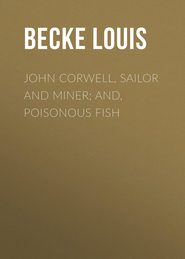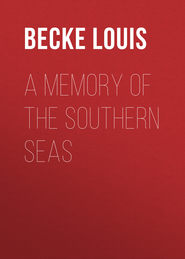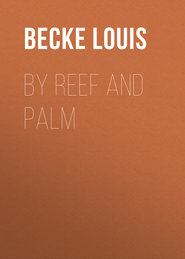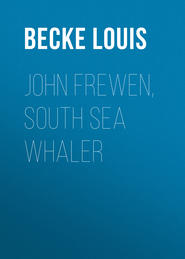По всем вопросам обращайтесь на: info@litportal.ru
(©) 2003-2024.
✖
The Strange Adventure Of James Shervinton
Настройки чтения
Размер шрифта
Высота строк
Поля
She came over to me, and then her thin little hand followed my forefinger as I made a pencilled mark on the chart to the south-east.
“Here is Tarawa; here is Apia in Samoa, nearly fifteen hundred miles distant. Here is the island of Ovalau in Fiji, about the same distance. Do you see?”
“Yes, I see.”
“And here, north-west from Tarawa, is your home on Guam—more than two thousand miles away. ‘Tis a long, long way—but it could be done.”
“A long, long way indeed.” She lifted her eyes to me—and then she placed her hand on mine. “Why do you smile, Mr. Sherry; and yet why say ‘it could be done’?”
“Let us sit down and talk the matter over quietly;” and I led her to a seat.
“Why should we go to Fiji or Samoa?” I said quickly, my blood afire with my new project. “There is nothing to draw you thither, is there?”
“Nothing. I know no one at either place. But you–”
“I! It matters but little to me where I go. But I am sick to death of this island, and long to be doing something. I am a man without a home, without ties, a wandering South Sea deadbeat—no friends.”
“You must not say that,” she said softly. “I am sure you have many friends. Just now you spoke of one—José Otano.”
“Aye, I did; but I meant friends in Europe, in the outer and greater world—people who care for, who even give me a passing thought.”
“That is sad, indeed. Oh, it must be sad to be alone, quite, quite alone in the world. And I am very, very sorry for you, Mr. Sherry.”
The deep ring of sympathy in her voice warmed my heart to the little woman.
“Mrs. Krause,” I said—and I spoke quietly, “you are a brave woman, else you would not dare to come with me in a small boat to so distant a place as Fiji or Samoa. But will you be braver still, and risk your life in a still more dangerous enterprise?”
“I will, indeed, Mr. Sherry. I have no sense of the fear of death—none, absolutely none,” she replied.
“Then let us give up the idea of Fiji,” I cried, catching her hand, “let us go to the north-west—to Guam, to your own home.”
“Oh,” and she gave a low gasp of pleasure. “Oh, yes, indeed, it will be a wonderful voyage.”
“Yes, if we ever get there,” I said. “But we can try.”
“You will not fail. Of that I am as sure as I am of my own existence.”
Again we turned to the chart, and were poring over it together when the messenger returned to say that the natives had arrived with the boat. I hurried down to the beach, and saw the native owners, and then the boat itself, which, after very little trouble, I bought for ten muskets, a couple of tierces of tobacco, and a hundred fathoms of red turkey twill. Then, after giving them some instructions, I went back to the house.
“Well, Mr. Sherry, what do you think of the boat?”
“Fairly well, Mrs. Krause. Anyway, I’ve bought her, and if you look out of the window, you’ll see the crew getting her under way again to sail her over to Utiroa. Now I must get home, for there will be much to do. The first thing that I must get done is to alter my own boat’s mainsail and jib, and make them large enough for my new ship, whose sails are quite rotten. Then I shall make an extra new suit as well. I’ll set Niâbon to work to-night.”
“Ah, let me help! Do. It would give me such real pleasure.”
“Indeed, I shall be very glad of your assistance. I can cut out the new suit, and you and Niâbon sew them. It will only be very light material, but, for all that, may make your fingers suffer.”
“I don’t mind if it does—neither of your sail-makers will grumble,” she said brightly. “When shall I come?”
“To-morrow. I’ll send the whale-boat for you. You will find mine an untidy house, and Tepi a great cook—as far as size goes. He stands six feet.”
And so with a laugh, and lighter hearts than had been ours for many a long day, we said goodbye till the morrow.
CHAPTER VIII
As soon as I arrived at Utiroa village with my new boat, I had her hauled up above high-water mark, close to the boat-shed, and then turned her over so as to get a good look at the bottom in the morning. Then without telling either Tematau or Niâbon the reason for my purchase, I bade them open my trade-room door, and in a few minutes we were engaged in paying the late owners their tobacco, guns, ammunition, and bolts of turkey twill. They were well satisfied with the price I paid them, especially when I supplemented it with the gift of a case of biscuit and a case of tinned Australian meats, of which I had an ample stock. They were very much disposed to remain in the house and give my servants their view of the cause of Krause’s strange disappearance, which was—as they had previously told me—that he had been seized and devoured by an enormous reptile, half eel and half turtle, which had been known to swallow not only human beings, but such trifles as double canoes, groves of coco-nut trees, etcetera; but on my telling them that I was very tired and wanted a quiet house, they retired to the native village to spend the night.
Calling Niâbon and Tematau to me, I told them why I had bought the boat. They both seemed very pleased, but somewhat to my astonishment showed no surprise at the change in my plans; and for a moment or two a swift suspicion crossed my mind.
Did they—or Niâbon at least—know that it was Mrs. Krause who had brought this boat to my notice? Had Mrs. Krause said anything on the matter to Niâbon herself? I determined to ask.
“Niâbon,” I said in English, which Tematau also understood fairly well, though he never spoke it, “tell me truly—did you or Tematau ever speak to Lucia of this boat which I have just bought?”
“No, never, Mr. Sherry,” she replied calmly, and the quiet dark eyes met mine with such an expression of truthfulness that I was instantly ashamed of my transitory suspicion. “I have never spoken to her about this boat, and never has Tematau, I am sure.”
“Oh, well, it was a very lucky thought of hers,” I said; “we have now a boat that will be much better than my own, which I must try and sell, for we shall want money, Niâbon, we shall want money badly in the strange country to which we are going, and I have but little.”
“Kaibuka and the head men will buy the other boat, I think.”
“How do you know?” I said in surprise, for I had never even been approached on the subject of selling my boat.
“I will ask them to buy it,” she replied, with a smile. “I will go to them now, if you wish. How much money do you want?”
“The boat is worth two hundred dollars, but I will take one hundred. If they cannot give me one hundred dollars I will take no less—but because they and I are good friends, I will give it to them freely, for it will be of no further use to me.”
“They will buy the boat,” she said confidently, and lighting her cigarette, she went out.
A quarter of an hour later she returned, accompanied by old Kaibuka and another head man. Each of them carried a small bag of money, which they handed to me, and simply observing that it was the price of the boat, sat down and waited for me to count the coins. I found there were two hundred dollars.
“There are one hundred dollars more than the price I asked,” I said, pushing one-half of the money apart. “The boat is well worth the two hundred; for she is but new, and cost me more than that. But one hundred is all I asked for.”
Hawk-eyed Kaibuka—one of the most avaricious old fellows I had ever met with in the South Seas—shook his head and said I was trying to wrong myself. The people would be glad to get such a fine boat for two hundred dollars, and that if he and the other head men announced that I had parted with her for a hundred dollars, the entire population of Utiroa would arise as one man and curse them as mean creatures; also they (the people) would refuse to use the boat, and he, Kaibuka, would be regarded as a hog—a man devoid of gratitude to the white man who had been kind to and had not cheated them.
“Take the money, Mr. Sherry,” said Niàbon in English; “they are glad to get the boat; and if I had said you wanted five, instead of one hundred dollars, they would give it. I would make them give it.”
“Very well, Niâbon. I’ll take it. But as it is more than I ought to expect under the circumstances, I will give them half a tierce of tobacco as a mea alofa (a gift of friendship).
“That means that you give them a hundred and twenty-five dollars’ worth of tobacco as a present,” she said, with an amused smile, “and so you sell your beautiful boat for seventy-five dollars.”
“Never mind my extravagance, Niâbon,” I said, in the same spirit; “the one hundred and twenty-five pounds of tobacco in the half-tierce, which only cost me a quarter of a dollar a pound, is better given away to these people than left here to rot.”
“Indeed it is,” she replied, as she watched Tepi and Pai roll out the half-tierce of the beloved tobacco from my trade-room into that in which we were sitting; “these people here will never forget you.”
As soon as old Kaibuka and the other head man had left—each after taking a stiff glass of grog—and the house was again quiet, Niâbon, Tepi, and I set to work to take stock, they calling out the various articles of my trade goods whilst I made out the list. We worked at this throughout the night, had an early breakfast, and then went at it again, and by nine o’clock the work was over, and I knew how I stood with my employers financially.
It was pretty satisfactory, considering the short time I had been on the island; for with my salary of ten pounds a month, and the five per cent, commission I was allowed on all the goods I sold, there were over three hundred pounds due to me. Then, in addition to my cash takings, which came to over three thousand dollars, I had bought over a hundred tons of copra (dried coco-nut) at a very low price, paying for it with trade goods—muskets, rifles, ammunition, tobacco, and liquor—on which latter article my esteemed employers made something like a thousand per cent, profit. Of course I had had a big pull over Krause, whose stock of trade was almost exhausted when I landed, whilst I had come ashore with half a schooner-load. But apart from this, it was a fillip to my vanity to think that even if Krause had had his store packed from floor to roof with trade, the natives would rather have come to me than to him, for as I have said, they all—even those in his own village of Taritai—disliked him for his domineering German-like manner, and his contemptuous disregard of their feelings, whilst I was persona grata with them from the day I landed. But I had never yet, in all my ten years’ experience of the South Seas, either seen, or heard, of any “Dutchman”—as we English and American traders call all Teutons—who was liked by the natives.
I closed up my account-books, and, lighting my pipe, considered the situation. Firstly, I was certainly breaking my engagement with my employers by leaving the island without giving them “due notice of one month”; but as I could only communicate with them once in eight months, when they sent a ship round the group, that particular item in my agreement did not disturb my mind to any great extent. Secondly, there was a nice little sum of money due to me—oyer three hundred pounds—which in all probability I should never get if I awaited my firm’s good pleasure to pay me, unless I went to Sydney and brought legal pressure to bear on them. Would not I be perfectly justified in paying myself my salary and commission out of the money in my possession? They would certainly look on me as an ass of the first water if I did not—of that I was sure. But again, I must not leave it in their power to say that “Jim Sherry had bolted from Tarawa,” and had not acted squarely with them.











